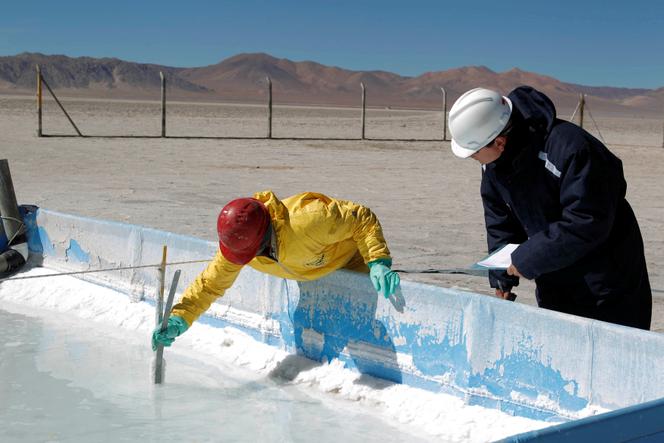


This is a real gamble in the current economic climate. On Wednesday, October 9, the Anglo-Australian mining group Rio Tinto formalized its takeover of the American lithium giant Arcadium Lithium for $6.7 billion (around €6.1 billion). A major transaction, at a time when the market for the star metal of electric batteries has been sluggish for several months. The price of the white gold has collapsed and is far from the highs it reached during the post-Covid recovery. A metric ton of lithium is now trading at around $10,000, more than 80% lower than in early 2023.
With this takeover, Rio Tinto's management is showing that it still believes in the future of lithium and in the electrification of industrial applications, and of cars in particular. However, the global market for electric vehicles has slowed down sharply in recent months, particularly in Europe, and the Chinese mining groups that dominate the lithium sector are scaling back production due to a lack of demand, after several years of very strong growth.
"Rio Tinto is confident in the long-term prospects for lithium, with a compound annual growth rate of more than 10% (...) expected until 2040, which will result in a supply deficit," the company stated in its takeover press release. The group headed by Jakob Stausholm is even convinced that it is making a good deal, believing that "this counter-cyclical acquisition comes at a time when the market has substantial long-term upside potential."
The Anglo-Australian giant, specialized in traditional industrial metals (steel, aluminum, copper), had little presence in the strategic lithium market until now. The acquisition of Arcadium makes it one of the world's largest producers of the mineral, alongside the Chinese groups Tianqi and Ganfeng, the American Albemarle and the Chilean SQM. "Acquiring Arcadium Lithium is a significant step forward in Rio Tinto's long-term strategy, creating a world-class lithium business, alongside our leading aluminum and copper operations, to supply materials needed for the energy transition," said Stausholm.
"With 2,400 employees worldwide, Arcadium has "an annual production capacity (...) of 75,000 tons of lithium carbonate equivalent [the chemical compound embedded in batteries], with expansion plans in place to more than double capacity by the end of 2028," said Rio Tinto.
Arcadium is a recent company – it was created by the merger, in January, of the American Livent and the Australian Allkem. It is present in various key sectors of the lithium industry, from mining to refining. It owns rock mines in Australia and mines and brines in Argentina. There, it recovers ore by evaporation in open-air basins (salars) or by direct extraction from the subsoil – a complex but lucrative technique also developed by the French mining group Eramet in Argentina. Arcadium also has refineries in the UK, Canada, the US and Japan.
You have 29.95% of this article left to read. The rest is for subscribers only.
